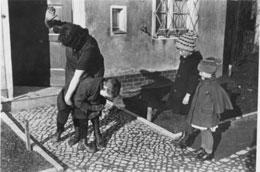Spanking: lots of studies; little change

Photo caption: Every culture thinks it is their tradition to spank their children, Dr. Joan Durrant notes. She feels it isn’t a tradition, but an entrenched habit that people have a hard time giving up because they haven’t seen viable alternative solutions./ Photo Credit: German Federal Archives via Wikimedia Creative Commons
By Florence Hwang
Experts say revoking the law that allows parents to spank their children can help clarify for newcomers the "mixed messages" they receive about corporal punishment in Canada.
Parents want to understand the law in Canada and how it fits in with their parenting style, notes Jean Tinling, the family program director at Mosaic Newcomer Family Resource Network.
“Their worries are reduced when they realize that they have a choice about keeping the best from their culture, adding in the best from Canadian culture and creating their own new third culture here in Canada,” she says. “They relax when they gain a better understanding of the law and when they realize that CFS [Child and Family Services] does not want to take their children or destroy their culture.”
Tinling feels this confusion for all parents can be done away by changing section 43 of the Criminal Code.
The Liberal government has agreed to remove a section of law that allows parents to spank their kids following the recommendations of the Truth and Reconciliation Commission, which was set up to inform Canadians about the experiences of indigenous children in residential schools.
Children’s rights
Researchers and parenting experts agree that overhauling section 43 is long overdue, as it infringes on the human rights of children.
“It’s overwhelming talking about the harm of physical punishment,” says Ailsa Watkinson, Faculty of Social Work graduate studies coordinator at the University of Regina’s Saskatoon campus.
Watkinson says she thinks children should be treated like any other human being. It’s important to maintain warmth and connection between parent and child and to build on mutual trust while understanding the child’s stage of development, including physical, mental and emotional, she adds.
Dr. Joan Durrant, Social Studies professor at the University of Manitoba, says that mild physical punishment has consequences for some children, and cites research that shows it is linked to aggression and mental health problems that can continue into adult life.
Durrant has been studying the physical punishment of children for about 25 years. She points out that spanking raises the risk of injuring the child, makes the child fearful of the parent, and affects the child’s brain.
In Saskatchewan, the Victims of Domestic Violence Act protects those who are abused by their partners. If there is a child who observes their mother is being beaten, that child is considered in need of protection; but if that child is being beaten, he or she is not protected under the Act, says Watkinson.
Making changes
Already, 48 countries have banned all forms of corporal punishment of children. Canada and the U.S. are not on that list.
Most parents – newcomers and Canadian born – parent the way they were parented, unless they learn and believe there is a more positive alternative, says Tinling. Physical and humiliating punishment is a very common method used to control children’s behaviour around the world, she adds.
“However, worldwide, it has been my experience that all parents love their children and want what is best for them,” says Tinling. “They want their children to learn to be respectful, to have positive social skills, and they also value having a positive relationship with their children.”
“Using aggression against a person does [the] exact opposite,” says Durrant.
She says she finds section 43 illogical, as there are laws that protect all other segments of society from physical harm, but not children.
“When it comes to your child, the law gives you a green light. There’s a message to parents that it’s not only OK, but actually the law says it’s justified,” she says. “It’s placing children at risk. And I find that absolutely unjust.”
Every culture thinks it is their tradition to spank their children, she notes. Durrant feels it isn’t a tradition, but an entrenched habit that people have a hard time giving up because they haven’t seen viable alternative solutions.
“There’s an assumption there that they are incapable of change,” notes Durrant, who doesn’t believe this assumption is correct.
Judy Arnall is an author and parenting expert. She takes issue with section 43’s wording of “reasonable force,” which she feels is very subjective.
“That’s why we need a very black-and-white law saying don’t do it. Ever. At all,” she says.
It’s an age-old issue.
“I remember talking to reporters 20 years ago and not much has changed. I think it is time [for this law to be abolished]. I tell my kids, ‘In your lifetime, I’m sure we’re going to change the law on this, because 48 countries have,’” she says.
This piece was originally published in New Canadian Media. See http://newcanadianmedia.ca/item/32815-spanking-lots-of-studies-little-change









